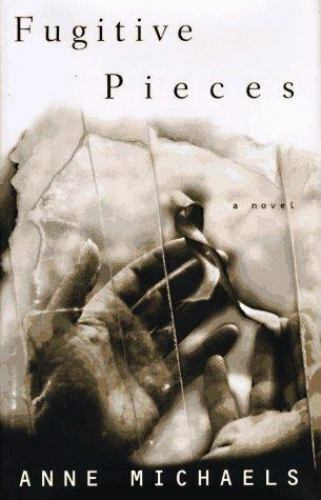Fugitive Pieces award-winning 1996 novel of Canadian author Anne Michaels. The book is told from two perspectives. The first is Jakob Beer, a Polish Holocaust survivor who lost his parents and sister in the war was rescued by archaeologist Athos Roussos and taken to Greece. Athos and Jakob eventually move to Canada, but underneath all of it, Jakob must wrestle with what he saw the day his family was massacred. The second part of the book is told from Ben's perspective. He is the child of Holocaust survivors and he eventually goes to Greece to find Jakob's journals.
Frankly, this is a tough read. The feelings of grief and the impact of trauma seep through every page and interaction that the characters have. The writing is powerful and intense, but as I was reading this right after Demon Copperhead, I think the deep depression hit me a little bit harder than it would have in another time. (I guess it won't surprise anyone to learn I followed this with a romance novel and a fantasy series to try and cheer things up a bit, will it?) I thought the first part of the book was more compelling than the second part, but I also really appreciated the way the author took the time to tell the story in a way that showed the long-term consequences of Jakob's trauma.
Anyway. It's powerful and well-done. But I wouldn't necessarily recommend you go out there and read it this minute. 4/5 stars
Lines of note:
All across Europe there's such buried treasure. A scrap of lace, a bowl. Ghetto diaries that have never been found. (page 40)
On the way home we passed walls scrawled with a huge V - Vinceremo, we shall overcome - in black paint. Or M - Mussolini Merda. Kostas explained why no one wanted to erase those symbols. During the occupation, graffiti required swiftness and courage. Graffitos who were caught were executed by the Germans on sight. A single letter was exhilarating, it was spit in the eye of the oppressors. A single letter was a matter of life and death. (page 78)
Sometimes a house waits for decades for a son to return. (page 84)
Translation is a kind of transubstantiation; one poem becomes another. You can choose your philosophy of translation just as you choose how to live: the free adaptation that sacrifices detail to meaning, the strict crib that sacrifices meaning to exactitude. The poet moves from life to language, the translator moves from language to life; both, like the immigrant, try to identify the invisible, what's between the lines, the mysterious implications. (page 109)
I know only fragments of what Athos's death contained: no less than all the elements and their powers, ten thousand names for things the humility of lichen. The instincts of migration: stars, magnetism, angles of light. The energy of time that alters mass. The elements that reminded him most of his country, salt: olives, cheese, vine leaves, sea foam, sweat...Two wars, which are both the rotten part of the fruit that can't be cut away and the fruit; that there's nothing a man will not do to another, nothing a man will not do for another. But who was the woman who first unbuttoned for him the two birds of her breasts in a night garden? (page 114)
Her mind is a palace. She moves through history with the fluency of a spirit, mourns the burning of the library at Alexandria as if it happened yesterday. She discusses the influence of trade routes on European architecture, while still noticing the pattern of light across a table... (page 176)
Things I looked up:
azimuth (page 33) - the direction of a celestial object from the observer, expressed as the angular distance from the north or south point of the horizon to the point at which a vertical circle passing through the object intersects the horizon (this definition lost me at "vertical circle")
siddur (page 39) - Jewish prayer book containing a set order of daily prayers
anabatic/katabatic winds (page 46) - thermally induced winds; anabatic wind is a warm wind that blows up a steep slope or mountain side (also known as upslope flow); katabatic wind is a drainage wind that carries high-density air from a higher elevation down a slope under the force of gravity (sometimes called fall winds)
Spectre of the Brocken (page 46) - Also called Brocken Specter, Brocken bow, mountain spectre is the magnified (apparently enormous) shadow of an observer cast in mid air upon any type of cloud opposite a strong light source - this phenomenon can appear on any misty mountainside, cloud bank, or be seen from an aircraft, but the frequent fogs and low-altitude accessibility of the Brocken, a peak in the Hars Mountains in Germany, have created a local legend from which the phenomenon draws its name
 |
| A Brocken spectre within glory rings - This picture was taken from the Golden Gate Bridge |
demotic (page 78) - an ancient Egyptian script; of the three scripts on the Rosetta Stone
logomachy (page 78) - an argument about words

Yes, I can see how this would be a tough read. But it sounds amazing- the writing is beautiful. i'm going to keep it in the back of my mind.
ReplyDeleteIt's hard to recommend this one, kind of like Demon Copperhead. Apparently I was reading a type of book for the last couple of weeks!
Delete